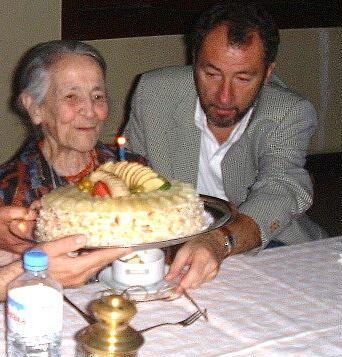by Samir Raafat
The Egyptian Gazette, April 12, 1997

Siwss Ambassador Blaise Godet looks on as Warda Bircher-Bleser celebrates her 92nd
|
|
|
|
|
|
EGY.COM - PERSONALITIES
|
|
by Samir Raafat
The Egyptian Gazette, April 12, 1997

Siwss Ambassador Blaise Godet looks on as Warda Bircher-Bleser celebrates her 92nd
SWISS Author, geologist and botanist Mrs. Warda Bircher-Bleser celebrated her 92nd on a bright April day last Tuesday at the Swiss consul's Maadi residence. Like her father, Alfred Bircher, Warda lived most of her life in Egypt. Her grandfather came to these parts during the second half of last century setting up a thriving import agency or wekala in Mousky. His descendants would become the Birchers of Egypt as opposed to other members of his clan - siblings, cousins and their progeny - who settled all over the world. A hundred years later a Bircher reunion was held at Kuttigen near Aarau, Switzerland, bringing together doctors, authors, scientists and generals of all ages. By now 'Bircher' had become an international household name thanks to an enterprising member of the clan who patented Bircher Musli, a wholesome breakfast cereal and dried fruit formula displayed on supermarket shelves all over the globe.
A geologist by profession Warda became an authority on botany long before her father left her his lifetime achievement in 1951 --a unique botanical experimental station in al-Saff near Wasta some 100-plus kilometers south of Cairo. During six decades, Alfred Bircher, his wife and their only daughter, succeeded in acclimatizing a number of tropical and subtropical fruit, timber trees and other unique ornamental plants to Egypt's climate. Single-handedly they had put this forgotten part of the Nile valley on the world's botanical map. After his death, Bircher's treasure trove or Garden of Eden as some chose to call it, became the responsibility of Warda and her Luxembourg-born husband, Dr. Paul Bleser, also a geologist.
Against all odds and during the difficult days when traveling was restricted and import of seeds and other varieties was practically impossible, the Blesers stood their ground succeeding where others had failed. Mainly because of the special character of their botanical gardens, they were granted a special status and allowed to both keep and run it. All of Egypt's other large landholdings meanwhile, were taken over by the State in compliance with the newly introduced Agrarian Reform Act.
Whenever the Blesers left al-Saff, which was very seldom, it was to visit their house in Maadi, one of the town's oldest. Otherwise, the couple remained in their wonderland entertaining, from time to time, like-minded international visitors. Despite their manifold responsibilities the Blesers compiled and published an invaluable 875-page botanical work entitled Gardens of Hesperides: A Book on Old and New Plants for Egypt and Similar Climes. But time and age would take their toll and al-Saff's demands seem to grow rather than diminis. The Blesers had reached their 80s and it was time to retire to Maadi. The Garden of Eden was reluctantly sold off in 1990. Dr. Paul Bleser died soon after.
Warda, carried on alone, filling her time with writing and research. Last year, she published her third book The Date Palm: A Friend and Companion of Man, (Elias Modern Press, Cairo, 1995). Her articles meanwhile are a delight to all those who subscribe to the local German-language magazine Papyrus, where the author shares delightful memories spanning nine decades of colorful Egyptian history.
Today, Warda Bircher-Bleser is the incontested doyen of Egypt's Swiss community followed closely by lifetime Maadi resident and renown artist, Margo Veillon, who turned 90 two months ago. We wish them both a happy centennial inchallah.
|
|
|
|